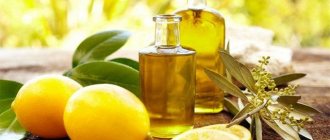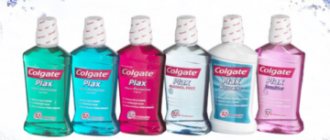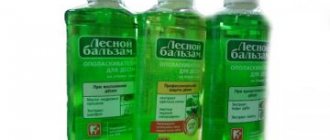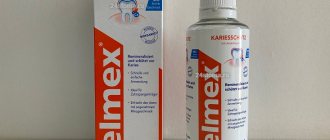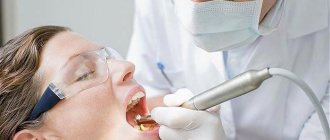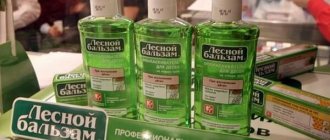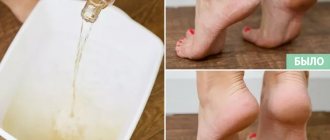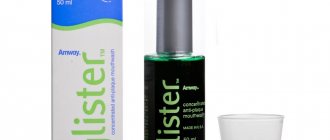The ancestors of modern mouthwashes
People have probably always felt the need to take care of oral hygiene. Descriptions of the technology of brushing teeth are found in the Torah and the Koran, in the writings of Hippocrates and in many other historical sources. Moreover, most often these are descriptions of prototypes of modern toothbrushes. Does this mean that mouthwashes are a modern invention? Not at all! And although the first specific descriptions and recipes for preparing elixirs for rinsing are found in much later sources, due to its accessibility, this method of hygiene was much more widespread than brushing teeth. The compositions of the first mouth rinses were simple. All kinds of decoctions of herbs, flowers, bark, essential oils and much more were used as a rinse.
Availability of products and their prices
[google]
Baby mouthwashes come in flavors that kids like: bubble gum, cinnamon, berry, mint, or citrus.
Rinse aids for children are sold in supermarkets, pharmacies, and stores. Their average cost ranges from 120 to 150 rubles.
The most popular mouthwashes for children contain fluoride to prevent tooth decay. For example, Oral-B Anti-Cavity Rinse and ACT for Kids have received approval from the American Dental Association (ADA). Listerine, Dr. Fresh and Vi-Jon are other popular brands that offer pre- and post-brushing rinses for children.
Types of mouth rinses
The entire variety of mouth rinses on the market can be divided into two main types: hygienic (sometimes also called cosmetic) and medicinal. The first perform mainly one function - refresh. Of course, they also help remove food debris, but they cannot help remove plaque and serious dental diseases. Also among them are whitening mouth rinses, but their effectiveness is questioned by many experts. The composition of cosmetic rinses does not vary much, and they themselves differ little from each other. As for medicinal rinses, they, depending on the active components included in the composition, differ in the direction of action. Among them are the following types:
- Mouth rinses that fight plaque and gingivitis. Such rinses reduce and slow down the formation of bacteria in the mouth. Due to the antiseptics included in the composition, most often chlorhexidine bigluconate (CURASEPT ADS 205 mouthwash or paroguard chx from Miradent) or triclosan.
- Anti-caries and strengthening mouth rinses. Such products fight the occurrence of caries and increased sensitivity of teeth due to the content of fluoride, which strengthens teeth (rinse Strengthening and remineralization of tooth enamel from Dofeel and 4-action Mouthwash from Biorepair. Most often, anti-caries rinses are prescribed to people undergoing orthodontic treatment with braces.
- Whitening rinses that fight the formation of plaque come with active oxygen (whitening rinse GLOBAL WHITE), various extracts and hydroxyapatite (White Shock BlanX rinse).
- Mouth rinses that fight the formation of tartar. The main component of these rinses is usually calcium citrate.
- Special balms for irrigators, which are recommended for use by people with problem gums and those who have various types of restorations and dentures.
What are the benefits of mouthwashes?
Of course, not a single product of this type can protect 100% from dental or periodontal diseases. However, they do a good job of fighting bacteria and freshening your breath. Thanks to herbal extracts, many of them quickly relieve gum inflammation.
Other benefits of using mouth rinses include:
- These are 100% ready-to-use solutions that are ideal for express care of teeth and gums.
- As a rule, rinses have a rather pleasant smell and taste, which creates a certain comfort when using them.
- Such products have a deodorizing effect, allowing you to maintain fresh breath almost all day long. Fragrances are usually mint or menthol.
- Therapeutic and prophylactic agents are characterized by anti-caries, anti-inflammatory and disinfectant effects. They can also significantly reduce tooth sensitivity.
- Mouthwashes that do not contain alcohol can be used by children aged 6 years and older, pregnant women and those with severe allergies to alcohol.
- Anti-caries products, due to fluorine and calcium, help strengthen the enamel. Such solutions can be used regularly.
Who really needs rinses, and who can they harm?
In the question of which mouth rinse to choose and whether you need it at all, as in any other matter related to oral hygiene, it is best to rely on the opinion of your doctor. If you have a specific problem: an increased risk of tooth decay, increased plaque formation, any gum disease, a lack of saliva production, or something similar, your doctor will select the appropriate product for you and give recommendations on how to use mouthwash correctly. Naturally, we will talk about a medicinal rinse.
As for cosmetic, or hygienic, rinses, there is actually no answer to the question of which mouth rinse is the best. As mentioned above, they are not much different from each other, and they do not bring any particular benefit; they even only mask bad breath and do not remove it. However, some of them can be harmful if the manufacturer, in pursuit of profit, did not take care of the quality of the components included.
Some mouth rinses can stain enamel and even cause plaque. The mouthwash may contain alcohol, including ethanol, which can cause serious problems if it enters the body. Even if you do not swallow mouthwash (and you should not swallow any of them, even those containing alcohol), ethanol still enters the blood in microscopic quantities, since it is absorbed in the oral cavity. If you do accidentally swallow a mouthwash, be sure to check its label: if it contains ethanol or fluoride, it is better to consult a doctor. By the way, children under 12 years of age should use mouth rinses strictly under the supervision of adults.
especially useful during the period of wearing braces, when the risk of caries occurrence and development increases
.
Criteria for choosing a rinse aid
It is necessary to choose a rinse aid carefully - this will help to avoid various misunderstandings in the future. That is why it is recommended that you first make an appointment for a consultation with your doctor to clarify your individual characteristics, because This or that solution is not suitable for everyone. In addition, in order to avoid purchasing a low-quality product, you should ask for the product only in trusted pharmacies.
Of course, daily use of mouthwash can protect you from many problems with teeth and gums. However, we should not forget that the choice of remedy is a rather personal issue that should be resolved with the help of a dentist. Often, an incorrectly selected solution can only aggravate existing diseases or cause banal irritation.
When buying a rinse liquid, you need to look, first of all, at the spectrum of its effects. So, to prevent caries, you should take a product with amino fluoride or sodium fluoride. Antiseptic rinses with a high content of chlorhexidine, triclosan and other substances should not be used for longer than 2-3 weeks. Otherwise, this will lead to disruption of the microflora in the mouth, as a result of which the mucous membrane may dry out and an odor may appear.
For those who have obvious gum problems and chronic gingivitis, liquids with herbal extracts and plant components are perfect. They can be used for quite a long time to achieve maximum effect. Often these are the solutions prescribed by periodontists during the treatment of gum inflammation.
How to use mouthwash correctly?
So, if you are advised to use mouthwash as an additional means for oral hygiene, then remember a few rules:
- First of all, study the label and, if possible, still consult with your doctor to determine whether this product is right for you and in what order it should be used - before or after brushing. The fact is that some rinses soften plaque and are therefore more effective before standard brushing, while others have a whitening or refreshing effect and are advisable to use at the end of the hygiene procedure.
- The standard “portion” for one rinse is about 50 grams (two tablespoons), duration is on average 1 minute. But for medicinal rinses, this time can be increased to 3 minutes.
- Never swallow mouthwash!
- It will be useful to use a mouthwash in combination with a dental irrigator.
Twin Lotus Guava and Green Tea mouthwash
performs a disinfecting function, freeing the mouth from remaining food particles, and also strengthens tooth enamel and reduces gum inflammation. It is especially pleasant that its use is not accompanied by dry mouth .
Features of the use of rinses -
Typically, mouth rinse is used 2 times a day (morning and evening - immediately after meals and subsequent brushing of teeth). The second option is that you can use the mouthwash immediately after lunch in the middle of the working day, but in this case, before rinsing, it is advisable to clean the interdental spaces from food debris using dental floss. We have listed the basic rules below.
Scheme for using mouth rinses -
- For rinsing, 10 ml of solution is enough (15-20 ml may be written on the rinse aid packaging, but this is only for the purpose of making you buy a new package faster),
- rinsing time averages from 45 to 60 seconds (the exact time depends on the type of rinse aid, and will be written on the product packaging; some types of rinses without alcohol and antiseptics, for example, Parodontotsid, 2-3 minutes are recommended),
- after spitting the solution, you should not rinse your mouth with water, eat for several hours, or drink for at least 30 minutes (this is a desirable rule that will increase the effectiveness of the procedure, but not mandatory),
- do not use rinses with alcohol, as well as products with antiseptics or antibiotics - more than 10-14 days (in this case you will get side effects).
When is it recommended to use?
Keep in mind! Not all children are able to clean their teeth efficiently using only toothpaste and a brush.
This is often due to a dislike of hygiene procedures, undeveloped coordination of movements, or a combination of these qualities.
Mouth rinse solutions are a kind of “final touch” and bring the result to perfection.
Until your baby gets used to rinsing his mouth and then spitting liquid into the sink, monitor his actions .
In addition, the baby mouthwash allows you to :
- reduce the likelihood of developing caries in baby teeth by 25%;
- accelerate processes after tooth loss;
- eliminate pathogenic fungi and bacteria;
- Form healthy habit every day .
Precautionary measures
If you use mouthwashes that contain alcohol, switch to alcohol-free formulations. If, for reasons of your dental health, you need to use alcohol-containing or medicated rinses produced by prescription with a high concentration of active substances, store them out of the reach of children. This measure will prevent poisoning. For a child weighing 12 kg, a dose of 150-300 ml of rinse aid can be lethal.
Be alert for signs of alcohol or fluoride poisoning. Signs of alcohol poisoning: irritability, a strong drop in blood sugar (hypoglycemia) as a result of the binding of glucose by alcohols, loss of consciousness, lethargy and convulsions. Signs of fluoride poisoning include shallow breathing, nausea, vomiting, diarrhea, abdominal pain, shock, hand tremors and convulsions. If your child has these symptoms, call a poison control center or 911 immediately.
